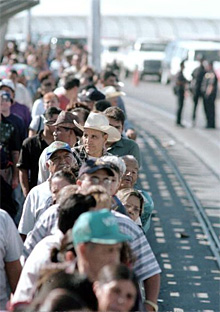
|
 |
 |
 News from Around the Americas | January 2008 News from Around the Americas | January 2008  
US Homeland Committee Told Ports Understaffed, Overloaded
 Alicia A. Caldwell - Associated Press Alicia A. Caldwell - Associated Press
go to original


| | Several witnesses testified that Homeland Security needs to fill its customs vacancies and hire several thousand additional agents to ensure security and shorten lines at the ports |
El Paso, Texas — Understaffed ports and overworked customs agents are leading to long border wait times, witnesses told visiting members of the U.S. House Committee on Homeland Security on Thursday.

The problem will worsen if more agents aren't hired and the Department of Homeland Security doesn't do something quickly to improve agency morale, National Treasury Employees Union President Colleen Kelley said.

"There is no way to reduce wait times, while maintaining security ... without increasing staffing," Kelley told the committee, chaired by Rep. Bennie Thompson, a Mississippi Democrat.

The committee met Thursday across the border from Ciudad Juarez, Mexico, to address border wait times that reached several hours at some ports, including El Paso, last year.

In his opening statement, Thompson said the need for more personnel, with perhaps more intensive training, is evident by recent cases involving tuberculosis patients allowed to freely cross the Mexican and Canadian borders despite warnings to customs officials.

"We need more of these personnel, and they need additional training to do their jobs more efficiently," Thompson said. "We also need to expand and improve aging infrastructure at our ports of entry, and build new ports to accommodate growing demand."

Kelley, who heads the union that represents rank and file customs agents, complained that agents were on duty too long — as long as 16 hours — and not being given enough time for additional training.

Customs and Border Protection, the Homeland Security agency assigned to the ports, was criticized in a recent Government Accountability Office report for not doing enough to screen people coming through the ports.

Richard Stana, the GAO director for homeland security and justice issues, testified that his agency found repeated violations of standards and practices at ports, including officers sending vehicles through at shift changes while waiting for computers to come online. He said staffing shortages and overworked officers were largely to blame.

Thomas Winkowski, assistant commissioner over customs' Office of Field Operations, took umbrage with parts of the GAO report, saying his officers do the best they can.

Lurita Doan, administrator for the U.S. General Services Administration, agreed that the nation's land ports need work and pledged to "build what we can, where we can, as fast as we can."

When asked by Thompson if the agency was adequately staffed, Winkowski said if more officers were hired "we could put them to work. There is plenty of work to be done."

When Thompson repeated his question, asking for a "yes" or "no," Winkowski reluctantly acknowledged, "We could use additional staffing."

Several witnesses testified that Homeland Security needs to fill its customs vacancies and hire several thousand additional agents to ensure security and shorten lines at the ports.

Asked for a specific recommendation by Rep. Henry Cuellar, a Laredo Democrat, Kelley said at least 4,000 new agents were needed.

Kathleen Campbell Walker, an El Paso immigration lawyer, testified that the problem of long waits may only get worse this year as new security initiatives require U.S. citizens passing through land ports to provide proof of both citizenship and identity.

"It will cause delays and it won't necessarily increase security and you won't know if someone is a U.S. citizen," Walker said.

She said a federally issued "pass card," which would contain much of the same identity and citizenship information as a passport but at a lower cost, is the best solution to requiring more documentation at ports. | 
 | |
 |



